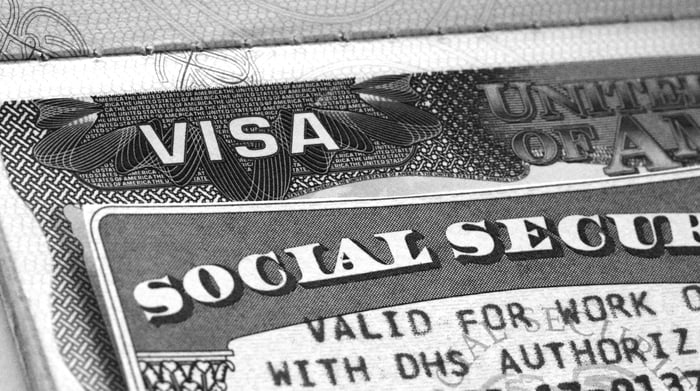For more than three months, America has felt the impact of the coronavirus disease 2019 (COVID-19) pandemic. While we've faced economic contractions and recessions before, we've never dealt with the unprecedented nature of disruption brought on by COVID-19. In a nine-week stretch, more than 39 million Americans have filed for initial unemployment benefits, with the official unemployment rate expected to make a run at the all-time record high of 25% set during the Great Depression.
With the understanding that shutting down nonessential businesses would lead to catastrophic economic damage, lawmakers passed and the president signed the Coronavirus Aid, Relief, and Economic Security (CARES) Act into law on March 27.

Image source: Getty Images.
The CARES Act provided much-needed stimulus -- just not enough of it
The CARES Act is the most expensive piece of relief legislation to ever be passed on Capitol Hill. At $2.2 trillion, it apportioned $100 billion to help hospitals fight the coronavirus, $500 billion for distressed industry loans, almost $350 billion for small business loans, and $260 to expand the unemployment benefits program. This "expansion" has meant an additional $600 per week for qualified unemployed persons, through July 31, 2020.
But what the American public is going to remember most about the CARES Act is the $300 billion in direct stimulus payouts (known officially as "Economic Impact Payments") to more than 150 million workers and seniors.
At their maximum, these payouts can total up to $1,200 per individual and $2,400 for a couple filing jointly. Qualifying dependents aged 16 and under also add $500 each to what a parent or household receives. To net this maximum payout, single, married, and head-of-household filers would need to have an adjusted gross income (AGI) under $75,000, $150,000, and $112,500, respectively, in their most recent tax filing.
Though the CARES Act was a much-needed step in the right direction for financially strapped workers, seniors, and families, it simply hasn't done enough for most folks. In fact, approximately three-quarters of Economic Impact Payment recipients used the entirety of their payout in four weeks or less. Considering that the U.S. economy isn't going to simply get back to normal at the flip of a switch, the need for additional financial aid is growing by the day.

Image source: Getty Images.
Meet the HEROES Act, which has already passed in the House
To date, more than a half dozen second stimulus proposals have been introduced in Washington, D.C. However, only one has managed to advance far enough to reach the congressional floor for vote (and passed): the 1,815-page Health and Economic Recovery Omnibus Emergency Solutions (HEROES) Act.
At a cost of $3 trillion, the HEROES Act would supplant the CARES Act as the most expensive piece of relief legislation in history. While not encompassing, here's some of what HEROES Act would do:
- Approximately $1 trillion would be set aside to cover pay for first-line workers and teachers.
- Some $200 billion would be allocated for the creation of a Heroes' Fund, which would provide hazard pay to essential workers.
- Unemployment benefit protections would be extended from the end of July through January 2021.
- An additional $75 billion would be apportioned for COVID-19 supplies and contact tracing measures.
- An estimated $175 billion would go to families to help pay their rent, mortgage, and utility payments.
- An extension of the employee retention tax credit, allowing employers to more easily keep staff on the payroll.
- And... a second round of direct stimulus would be headed Americans' way.
What would you receive if the HEROES Act were signed into law, as-is? Similar to the CARES Act, the maximum payout is $1,200 per individual and $2,400 per couple, with the qualifying AGI thresholds exactly the same as the CARES Act.

Image source: Getty Images.
What differs is that dependents (limit three) can add $1,200 each to what a parent or household receives, rather than just $500 per qualifying dependent. Furthermore, all dependents can qualify to bolster the payout of what a parent or household receives, not just those under the age of 17. With a limit of three qualifying dependents per household, a married couple could rake in as much as $6,000 under the HEROES Act.
One additional change that's worth noting is that noncitizens would be able to receive payments under the HEROES Act, which is in direct contrast to the CARES Act. As long as a noncitizen has a taxpayer identification number, that person could qualify for a payment.
The three biggest obstacles the HEROES Act will face in the Senate
On May 15, the Democrat-led House of Representatives passed the HEROES Act by what was a nearly party-line vote of 217 in favor to 189 against. With this second stimulus bill now in the Senate, attention now turns to what aspects of the bill may need some tweaking to get the Republican-led Senate onboard. The way I see it, there are three virtually insurmountable obstacles that'll need to be addressed before the HEROES Act becomes law.
First of all, there's real concern among Republicans in the Senate that expanding unemployment benefit protections will have long-term negative consequences on the U.S. economy. By offering eligible unemployed workers $600 per week above and beyond what they'd typically receive from the unemployment program, it may discourage these folks from going back to work. This would delay the restart of the U.S. economy and undoubtedly hurt the Social Security program, which relies on payroll tax revenue to account for 89% of the money it collects. Unemployment benefits aren't subject to Social Security's payroll tax.

Image source: Getty Images.
Second, there's almost no question there will be a disagreement over noncitizens receiving a HEROES Act stimulus payout. Democrats and Republicans have long-standing ideological differences when it comes to nonresident aliens living in the United States. Even though some of these nonresidents are paying federal tax via a taxpayer identification number, they aren't guaranteed a pathway to citizenship. That makes this component of the HEROES Act one that the GOP will almost certainly reject.
Third and finally, it could be difficult to convince Senate Republicans based solely on cost. In April, the Congressional Budget Office estimated that the annual federal deficit would reach $3.7 trillion in fiscal 2020 (ended Sept. 30, 2020). While additional stimulus isn't out of the question, ballooning the deficit by an additional $3 trillion may not be what GOP lawmakers had in mind.
To add to this point, Senate Majority Leader Mitch McConnell (R-Ky.) has been vocal about wanting to allow the CARES Act time to work its way into the U.S. economy before hastily approving another round of stimulus.
While I do believe the possibility of another round of stimulus has grown significantly in recent weeks, I don't believe the HEROES Act, as it's currently written, has a chance of passing the Republican-led Senate.






